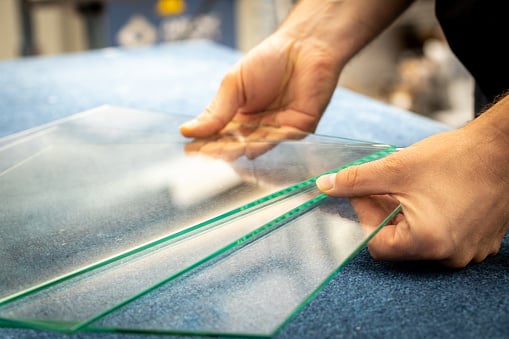
Window replacement enhances your home's appearance and helps to maintain a consistent indoor temperature. Discover the cost of window replacement in Columbus.
Don’t let the details weigh you down


The weight of glass depends on the area and thickness.
The average rectangular window weighs 20 to 30 lbs.
The average sliding window weighs 45 lbs.
Work with a local window installer to ensure your windows are level and airtight.
If replacing or installing windows yourself, you’ll need a partner to assist with the weight.
Knowing the weight of your glass helps you plan your design, support structure, transportation, and installation. Learn how much glass weighs with our glass weight calculator. No matter the size, shape, and thickness of your glass, we’ve got you covered.
Based on the size, shape, and thickness of the glass, refer to the table below to estimate how much your glass weighs.
| Shape | Size (in Feet) | Area in Square Feet | Thickness | Weight |
|---|---|---|---|---|
| Rectangle | 2x3 | 6 | ⅛ inch | 9.87 lbs. |
| Rectangle | 2x3 | 6 | ¼ inch | 19.74 lbs. |
| Rectangle | 2x4 | 8 | ⅛ inch | 13.16 lbs. |
| Rectangle | 2x4 | 8 | ¼ inch | 26.32 lbs. |
| Square | 3x3 | 9 | ⅛ inch | 14.81 lbs. |
| Square | 3x3 | 9 | ¼ inch | 29.61 lbs. |
| Oval | 2x2.5 | 3.94 | ⅛ inch | 3.27 lbs. |
| Oval | 2x2.5 | 3.94 | ¼ inch | 6.53 lbs. |
| Circle | 3-foot diameter | 7.1 | ⅛ inch | 4.21 lbs. |
| Circle | 3-foot diameter | 7.1 | ¼ inch | 8.43 lbs. |
Using your glass square footage and thickness, apply the following formula to determine how much your glass weighs:
Glass Weight (lbs) = Area (ft²) * Thickness (in) * Density (10.4 lbs/ft²)
Example: 20.8 lbs = 8 square feet * 0.25 inches * 10.4 lbs/ft²

The key measurements for calculating the weight of glass are the area and the thickness. By multiplying these measurements, you can calculate the volume of the glass and, subsequently, its weight.
Measure the length and width of your square or rectangle, and record the measurements. Multiply the length by the width to get the area.
For irregularly shaped glass, such as ovals, circles, and triangles, you’ll need to determine the area using a specific formula. Each shape has its own formula for calculating the area.
Circle: Area of a circle = π × r2
R equals the radius of the circle, π is pi, or 3.14
Oval: Area = π * a * b
A is the semimajor (longer) axis, B is the semiminor (shorter) axis, π is pi, or 3.14
Triangle: Area = (1/2) * base * height
Custom: Find the formula for the area of your given shape.
Installing new windows takes precision, tools, and practice. Work with a local window installation pro to ensure your windows are level and airtight. The cost of a window installer ranges from $100 to $300 per window for labor, depending on the size and type of window. If you’re a handy DIYer, you can install replacement windows yourself. But for new construction windows, hire a pro unless you’re an experienced carpenter or handyman.
From average costs to expert advice, get all the answers you need to get your job done.

Window replacement enhances your home's appearance and helps to maintain a consistent indoor temperature. Discover the cost of window replacement in Columbus.

Wooden windows elevate a home’s curb appeal and have a lifespan of up to 45 years. Learn about the cost of wooden windows and how to get an estimate.

Window repair costs in Columbus, Ohio, depend on several pricing factors, including the type and size of the repair it needs and the window itself.

What is a window sash? Learn why this feature for letting in fresh air can make or break the rest of your window.

Not sure how to protect skylights from hail? We’re breaking down how you can DIY your way to a safer home by ensuring hail doesn’t damage skylights.

If you're having problems with window film that include bubbling, peeling, and water spots, come learn about the simplest solutions for making window tint look good again.